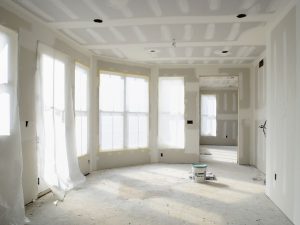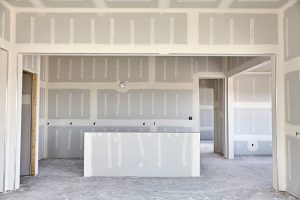Drywall, also known as gypsum board or plasterboard, is a foundational building material widely used in the construction industry for creating interior walls and ceilings. The choice of materials in drywall installation is of paramount importance as it significantly affects the structural integrity, safety, aesthetic appeal, and overall longevity of the walls and ceilings. In this comprehensive exploration, we will delve deep into the numerous reasons why the use of high-quality drywall materials is essential for both residential and commercial construction projects.
1. Structural Integrity
The structural integrity of walls and ceilings is a primary concern in construction. High-quality drywall materials are engineered to provide uniform thickness and density, ensuring the walls remain robust and stable over time. This uniformity in material thickness is essential in preventing structural issues such as warping and sagging. When quality materials are used, the drywall installation can withstand the test of time, providing a sturdy framework for the entire structure.
On the other hand, low-quality or substandard drywall materials may have inconsistencies in their composition, which can compromise the structural strength of the installation. Irregular thicknesses can lead to an uneven and unstable surface, which can cause cracks, distortions, and other issues in the long run. To avoid structural problems and ensure the reliability of the construction, investing in high-quality drywall materials is paramount.
2. Smooth Finish
Achieving a smooth and seamless finish is not just a matter of aesthetics; it also has practical implications. High-quality drywall materials are known for their smooth surfaces, which require less effort to prepare and finish. A smooth surface is the foundation for a professional, polished finish. It facilitates the application of joint compound and sanding, resulting in a visually appealing final product.
The superior finish achievable with high-quality drywall materials can be contrasted with the challenges posed by lower-quality materials. Subpar materials often come with surface imperfections, such as uneven textures or rough spots. These imperfections can make it difficult to attain a professional-looking finish, even with skilled craftsmanship. Achieving a smooth and seamless surface is not only aesthetically pleasing but also enhances the durability of the installation.
3. Moisture Resistance
In construction projects, particularly in areas prone to moisture, such as bathrooms, kitchens, and basements, the choice of drywall materials plays a critical role in ensuring durability and preventing potential problems. High-quality moisture-resistant drywall, commonly known as “green board” or cement board, is engineered specifically to withstand the effects of moisture and humidity.
Quality moisture-resistant drywall is equipped with enhanced properties to protect it from moisture-related damage. The paper facing of such drywall is treated to resist moisture absorption, which is vital for preventing the growth of mold and the deterioration of the drywall due to prolonged exposure to moisture. Using inferior materials in these moisture-rich environments can lead to structural damage and create health hazards due to mold growth.
4. Fire Resistance
Safety is a primary concern in construction, and fire safety is a critical component of ensuring the well-being of occupants. High-quality drywall materials with superior fire resistance, like Type X drywall, are indispensable in applications where fire safety is a primary concern.
Type X drywall is engineered to slow down the spread of fire, providing critical extra minutes for occupants to evacuate a building in case of a fire emergency. It is formulated with materials that are less susceptible to combustion and smoke production, which can be life-saving in critical situations. Using lower-quality materials with inferior fire-resistant properties can have devastating consequences during a fire event, potentially endangering lives and causing substantial property damage.
In many construction projects, soundproofing is a critical consideration, particularly in residential and commercial buildings. High-quality drywall materials can significantly reduce sound transmission between rooms, contributing to a more comfortable and private living or working environment.
Specialized acoustic drywall or other soundproofing drywall products are designed to minimize the transfer of sound. These materials offer an effective solution for reducing unwanted noise between spaces. Soundproofing is particularly crucial in residential applications, where maintaining privacy and quiet living spaces is a top priority, and in commercial settings, where reducing noise pollution can enhance productivity and customer satisfaction.
6. Ease of Installation
The choice of materials not only affects the final quality of the installation but also plays a significant role in the ease of installation. High-quality drywall sheets are manufactured with precise dimensions, which makes them easier to cut, hang, and finish. This precision simplifies the installation process and saves both time and labor costs.
For contractors and builders, working with quality materials means fewer adjustments and less material waste. The consistent dimensions of quality drywall sheets make them fit seamlessly, reducing the need for extensive cutting and rework. This efficiency is especially important in large construction projects, where time is a critical factor.
7. Longevity
One of the most significant benefits of using high-quality drywall materials is the extended longevity they provide. Quality materials are less prone to damage, such as cracks, dents, or warping. This durability ensures that the walls and ceilings will remain in good condition for an extended period, reducing the need for frequent repairs and replacements.
Over time, inferior materials can deteriorate and develop structural issues. Cracks may form, leading to water infiltration, pest problems, and further damage. Warping or sagging can affect the structural stability of the walls and ceilings, posing safety concerns. By using quality materials, the need for frequent repairs and replacements is minimized, saving both time and resources in the long term.
8. Aesthetic Appeal
Aesthetics in construction should not be underestimated. The appearance of walls and ceilings greatly contributes to the overall ambiance and value of a property, particularly in residential spaces. High-quality drywall materials result in smoother surfaces, creating a more attractive canvas for paint, texture, or decoration.
In contrast, lower-quality materials can have surface imperfections, such as rough textures, inconsistent finishes, or visible seams. These imperfections can show through the paint or other wall coverings, making it challenging to achieve a visually appealing finish. Aesthetically pleasing walls and ceilings enhance the value and desirability of a property.
9. Energy Efficiency
In the era of increased awareness about energy efficiency and sustainability, the choice of drywall materials can have a significant impact on a building’s energy performance. Some drywall products are designed with improved thermal insulation properties. These materials can help enhance the energy efficiency of a building by providing better temperature regulation.
Quality drywall materials with enhanced thermal insulation properties can contribute to reduced heating and cooling costs. They act as a barrier to temperature fluctuations, reducing the workload on heating and cooling systems. Consequently, energy efficiency leads to lower utility bills and a reduced carbon footprint, aligning with the growing emphasis on sustainable and environmentally friendly construction practices.
In contrast, using low-quality materials with poor insulation properties can result in higher energy bills and decreased comfort within the building. These materials are less effective at regulating temperature, leading to increased energy consumption.
10. Regulatory Compliance
Building codes and regulations are in place to ensure the safety and quality of construction projects. Many codes specify the use of particular types of drywall materials in specific areas or applications. Building codes often require the use of quality materials that meet or exceed specific standards to ensure the safety and well-being of occupants.
Failing to comply with these regulations can lead to legal issues, building code violations, and even the need for costly corrections. It’s essential to use quality materials that adhere to the standards set by building codes to ensure regulatory compliance and avoid potential legal problems and project delays.
Conclusion
In conclusion, the importance of using quality materials in drywall installation cannot be overstated. The choice of drywall materials impacts not only the structural integrity and safety of a building but also its aesthetic appeal, functionality, and long-term cost-effectiveness. High-quality drywall materials contribute to smoother finishes, moisture and fire resistance, soundproofing, ease of installation, longevity, energy efficiency, and compliance with building regulations.
Whether in residential or commercial construction, the use of high-quality drywall materials is crucial for creating durable, safe, and aesthetically pleasing interior spaces. It provides a strong foundation for further interior design and decoration, and it ensures that the structure will stand the test of time with minimal maintenance.
As construction practices continue to evolve, the importance of quality materials in drywall installation remains a timeless and non-negotiable element of building construction. In every project, the choice of materials must align with the goals of structural integrity, safety, and long-term performance, creating spaces that are not only structurally sound but also aesthetically pleasing, energy-efficient, and safe for occupants. By prioritizing quality materials, construction professionals and homeowners alike can enjoy the numerous benefits that high-quality drywall materials bring to their projects.






